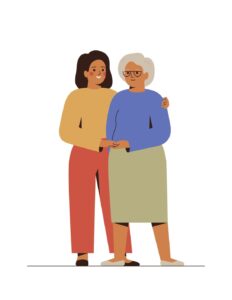The diagnosis of Alzheimer’s disease has devastating effects not only on the victims of this illness but also on the caregivers of these patients, a role that may last years and will grow significantly as the disease worsens. As their independence wanes, they will require assistance in all facets of their function, from paying their bills to assisting in grooming and toileting to eventually providing 24-hour care for safety.
In a recent study, authors generated a questionnaire completed by 200 caregivers, and most caregivers are family members (78%). Caregivers find this new role a significant source of stress resulting in decreased sleep and a sense of isolation from the remainder of their family. Additionally, stress arose from a lack of medical experience and concern for their own health. About half of caregivers cope by increasing physical activity and about a third by increasing alcohol and marijuana usage. The primary motivator for assuming this role was a sense of duty and love (75%). While many caregivers have other support systems, this role negatively impacts caregivers’ physical, mental, and social health.
Additionally, there are significant financial implication from assuming this role: 57% go to work late, leave early or take time off. Almost 20 percent have to take a leave of absence or reduce from full-time or part-time work. Nearly 25% dedicate 24 hours a day to caring for the patient.
As the number of Alzheimer patients in the US grows, so does the number of resources available.
BeCare Neuro Link can help both with screening your loved ones you suspect have cognitive impairment and tracking their disease over time. Using this tool is more important than ever as new agents are on and are entering the market that directly stop the deposition of amyloid which causes the disease. The most impact on helping patients is made if the disease is detected early. BeCare Neuro Link can alert you when you are performing less than expected and suggest when you may want to seek evaluation.
Resource:
Health Psychol Res. 2022; 10(3): 37454. Published online 2022 Aug 20. doi: 10.52965/001c.37454
